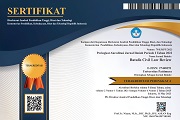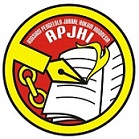Hambatan Penerapan Kebijakan Energi Terbarukan di Indonesia
 ), Sapto Hermawan(2)
), Sapto Hermawan(2)
(1) Fakultas Hukum Universitas Sebelas Maret, Surakarta, Indonesia
(2) Fakultas Hukum Universitas Sebelas Maret, Surakarta, Indonesia
 Corresponding Author
Corresponding Author
Abstract
Indonesia is a country with a lot of undeniable wealth. Besides the wealth of social and culture, Indonesia also gifted with very abundant natural resources. Which also include those potential renewable energy sources which can be found in every corner of the country. With this kind of wealth, Indonesia should be able to have resilience, independence, and energy sovereignty that sufficient the needs of its people. Unfortunately, currently Indonesia still relies on non-renewable energy sources to support the development and economic activities of its people. By using the literature method through primary and secondary data sources, this study aims to identify any obstacles in implementing renewable energy policies in Indonesia. The results of this research is that there are two main obstacles on implementing renewable energy sources; both of them are juridical obstacle and social obstacle.
Keywords
DOI
10.47268/ballrev.v3i2.1012
Published
2022-08-26
How To Cite
@article{BALLREV1012,
author = {Sahid Kalpikajati and Sapto Hermawan},
title = {Hambatan Penerapan Kebijakan Energi Terbarukan di Indonesia},
journal = {Batulis Civil Law Review},
volume = {3},
number = {2},
year = {2022},
keywords = {Energy Resources; Renewable Energy; Juridical; Social},
abstract = {Indonesia is a country with a lot of undeniable wealth. Besides the wealth of social and culture, Indonesia also gifted with very abundant natural resources. Which also include those potential renewable energy sources which can be found in every corner of the country. With this kind of wealth, Indonesia should be able to have resilience, independence, and energy sovereignty that sufficient the needs of its people. Unfortunately, currently Indonesia still relies on non-renewable energy sources to support the development and economic activities of its people. By using the literature method through primary and secondary data sources, this study aims to identify any obstacles in implementing renewable energy policies in Indonesia. The results of this research is that there are two main obstacles on implementing renewable energy sources; both of them are juridical obstacle and social obstacle.},
issn = {2746-8151}, pages = {187--207} doi = {10.47268/ballrev.v3i2.1012},
url = {https://fhukum.unpatti.ac.id/jurnal/ballrev/article/view/1012}
}
Abdullah, Ilmi. Nurdin, Jufrizal., Hasanuddin, H. (2016). Kajian Potensi Energi Angin di Daerah Kawasan Pesisir Pantai Serdang Bedagai Untuk Menghasilkan Energi Listrik. Jurnal Ilmiah “MEKANIK” Teknik Mesin ITM, 2(1), 31–38. Adistia, N. A., Nurdiansyah., R. A., Fariko, Juno., Vincent., Simatupang, J. W. (2022). Potensi Energi Panas Bumi, Angin, dan Biomassa Menjadi Energi Listrik di Indonesia. Jurnal Teknik Elektro, 22(2), 105–116. DOI: 10.24912/tesla.v22i2.9107 Ahluriza, P., Harmoko, U. (2021). Analisis Pemanfaatan Tidak Langsung Potensi Energi Panas Bumi di Indonesia. Jurnal Energi Baru Dan Terbarukan, 2(1), 53–59. https://doi.org/10.14710/jebt.2021.11075 Alrikabi. (2014). Renewable Energy Types. Journal of Clean Energy Technologies, 2(1), 61–64. DOI: 10.7763/JOCET.2014.V2.92 Arifin, R., & Putri, W. O. (2019). Penegakan Hukum Terhadap Anggota Legislatif dalam Kasus Tindak Pidana Korupsi di Indonesia. Al Daulah: Jurnal Hukum Pidana Dan Ketatanegaraan, 8(1), 1–15. https://doi.org/10.24252/ad.v8i1.7367 Derbali, A., Wu, S., Jamel, L. (2020). OPEC news and predictability of energy futures returns and volatility: evidence from a conditional quantile regression. Journal of Economics, Finance and Administrative Science, 25(50), 239–259. https://doi.org/10.1108/JEFAS-05-2019-0063 Kholiq, I. (2015). Pemanfaatan Energi Alternatif Sebagai Energi Terbarukan Untuk Mendukung Subtitusi BBM. Jurnal IPTEK, 19(2), 75–91. https://doi.org/10.31284/j.iptek.2015.v19i2.12 Prasetyo, A., Notosudjono, D., Soebagja, H. (2019). Studi Potensi Penerapan dan Pengembangan Pembangkit Listrik Tenaga Angin di Indonesia. Jurnal Online Mahasiswa (JOM), 1(1), 1–12. Rendi, Rendi., Arifin, Jainal., Mujiburrahman., Trianiza, I. (2020). Potensi Pembangkit Listrik Tenaga Air Mikrohidro di Sungai Pintab dan Sungai Amandit Kalimantan Selatan. Jurnal Engine: Energi Manufaktur, Dan Material, 4(2), 46–52. http://dx.doi.org/10.30588/jeemm.v4i2.733 Rialp-Criado, A., Zolfaghari Ejlal Manesh, S.M., Moen, Ø. (2020). Home (not so) sweet home: Domestic political uncertainty driving early internationalisation in the Spanish renewable energy context. Critical Perspectives on International Business, 16(4), 379–406. https://doi.org/10.1108/cpoib-03-2018-0031 Santoso, L., & Meyrasyawati, D. (2015). Model Strategi Kebudayaan Dalam Pemberantasan Korupsi di Indonesia. JRP (Jurnal Review Politik), 5(1), 22–45. Sari, D. A., H. (2013). Proses Produksi Bioenergi Berbasis Bioteknologi. Jurnal Aplikasi Teknologi Pangan, 2(3), 108–113. Šprajc, P., Bjegović, M., & Vasić, B. (2019). Energy security in decision making and governance - Methodological analysis of energy trilemma index. Renewable and Sustainable Energy Reviews, 114. https://doi.org/10.1016/j.rser.2019.109341 Taufiqurrahman, Asa., Windarta, J. (2020). Overview Potensi dan Perkembangan Pemanfaatan Energi Air di Indonesia. JEBT: Jurnal Energi Baru & Terbarukan, 1(3), 124–132. https://doi.org/10.14710/jebt.2020.10036 Weiss, O., Pareschi, G., Georges, G., & Boulouchos, K. (2021). The Swiss energy transition: Policies to address the Energy Trilemma. Energi Policy, 148. https://doi.org/10.1016/j.enpol.2020.111926 Widayana, G. (2012). Pemanfaatan Energi Surya. Jurnal Pendidikan Teknologi Dan Kejuruan (JPTK), 9(1), 37–46. https://doi.org/10.23887/jptk-undiksha.v9i1.2876 Yandri, V. R. (2012). Prospek Pengembangan Energi Surya Untuk Kebutuhan Listrik di Indonesia. Jurnal Ilmu Fisika (JIF), 4(1), 14–19. https://doi.org/10.25077/jif.4.1.14-19.2012 Brown, P. (2013), “European Union wind and solar electricity policies: overview and considerations”, in CRS Report for Congress, Vol. 43176. CEIC (2021). China Oil Consumption. Retrieved from https://www.ceicdata.com/en/indicator/china/oil-consumption, diakses pada 22 Juni 2022 CNBC Indonesia (2018). RI Punya Potensi 978 MW Tenaga Angin, Ini Sebarannya. Retrieved from https://www.cnbcindonesia.com/news/20180924102847-4-34413/ri-punya-potensi-978-mw-tenaga-angin-ini-sebarannya, diakses pada 22 Juni 2022 CNBC Indonesia (2022). Pak Jokowi! Investasi Energi Terbarukan Tak Capai Target Nih. Retrieved from https://www.cnbcindonesia.com/news/20220117122920-4-307921/pak-jokowi-investasi-energi-terbarukan-tak-capai-target-nih, diakses pada 29 Mei 2022 CNBC Indonesia. (2022). Terbesar Kedua Setelah AS, Panas Bumi RI Kunci Dekarbonisasi. Retrieved from https://www.cnbcindonesia.com/news/20220610160212-4-346084/terbesar-kedua-setelah-as-panas-bumi-ri-kunci-dekarbonisasi, diakses pada 22 Juni 2022 EIA (2022). How much oil is consumed in the United States?. Retrieved from https://www.eia.gov/tools/faqs/faq.php?id=33&t=6, diakses pada 22 Juni 2022 EIA. (2022). What countries are the top producers and consumers of oil?. https://www.eia.gov/tools/faqs/faq.php?id=709&t=6, diakses pada 22 Juni 2022 IESR (2021). Indonesia Solar Potential Report. Retrieved from https://iesr.or.id/en/agenda-iesr/indonesia-solar-potential-report, diakses pada 22 Juni 2022 Indonesia Investment (2015), “Energi Panas Bumi”. Retrieved from https://www.indonesia-investments.com/id/bisnis/komoditas/energi-panas-bumi/item268, diakses pada 29 Mei 2022 Liputan6.com (2021). Masih Dominan, Penggunaan Energi Fosil di Indonesia Capai 88 Persen. Retrieved from https://www.liputan6.com/bisnis/read/4712371/masih-dominan-penggunaan-energi-fosil-di-indonesia-capai-88-persen, diakses pada 29 Mei 2022 Tempo.co (2022). Kerugian Akibat Korupsi Rp62 T di 2021, ICW Kritik KPK Cuma Tangani 1 Persen. Retrieved from https://nasional.tempo.co/read/1594071/kerugian-akibat-korupsi-rp62-t-di-2021-icw-kritik-kpk-cuma-tangani-1-persen/full&view=ok, diakses pada 29 Mei 2022
| Dublin Core | PKP Metadata Items | Metadata for this Document | |
| 1. | Title | Title of document | Hambatan Penerapan Kebijakan Energi Terbarukan di Indonesia |
| 2. | Creator | Author's name, affiliation, country | Sahid Yudhakusuma Kalpikajati; Fakultas Hukum Universitas Sebelas Maret, Surakarta; Indonesia |
| 2. | Creator | Author's name, affiliation, country | Sapto Hermawan; Fakultas Hukum Universitas Sebelas Maret, Surakarta; Indonesia |
| 3. | Subject | Discipline(s) | |
| 3. | Subject | Keyword(s) | Energy Resources; Renewable Energy; Juridical; Social |
| 4. | Description | Abstract | Indonesia is a country with a lot of undeniable wealth. Besides the wealth of social and culture, Indonesia also gifted with very abundant natural resources. Which also include those potential renewable energy sources which can be found in every corner of the country. With this kind of wealth, Indonesia should be able to have resilience, independence, and energy sovereignty that sufficient the needs of its people. Unfortunately, currently Indonesia still relies on non-renewable energy sources to support the development and economic activities of its people. By using the literature method through primary and secondary data sources, this study aims to identify any obstacles in implementing renewable energy policies in Indonesia. The results of this research is that there are two main obstacles on implementing renewable energy sources; both of them are juridical obstacle and social obstacle. |
| 5. | Publisher | Organizing agency, location | Faculty of Law, Universitas Pattimura |
| 6. | Contributor | Sponsor(s) | |
| 7. | Date | (YYYY-MM-DD) | 2022-08-26 |
| 8. | Type | Status & genre | Peer-reviewed Article |
| 8. | Type | Type | |
| 9. | Format | File format | |
| 10. | Identifier | Uniform Resource Identifier | https://fhukum.unpatti.ac.id/jurnal/ballrev/article/view/1012 |
| 10. | Identifier | Digital Object Identifier | 10.47268/ballrev.v3i2.1012 |
| 11. | Source | Title; vol., no. (year) | Batulis Civil Law Review; Vol 3, No 2 (2022): VOLUME 3 NOMOR 2, NOVEMBER 2022 |
| 12. | Language | English=en | en |
| 13. | Relation | Supp. Files | |
| 14. | Coverage | Geo-spatial location, chronological period, research sample (gender, age, etc.) | |
| 15. | Rights | Copyright and permissions | Copyright: Authors who publish their manuscripts in this Journal agree to the following conditions: 1. The copyright in each article belongs to the author, as well as the right to patent. 2. Authors are able to enter into separate, additional contractual arrangements for the non-exclusive distribution of the journal's published version of the work (e.g., post it to an institutional repository or publish it in a book), with an acknowledgment of its initial publication in this journal. 3. Authors are permitted and encouraged to post their work online (e.g., in institutional repositories or on their website) prior to and during the submission process, as it can lead to productive exchanges, as well as earlier and greater citation of published work. 4. Authors have the right to self-archiving of the article (Author Self-Archiving Policy)
Licence : Batulis Civil Law Review Journal is disseminated based on the Creative Commons Attribution-NonCommercial 4.0 International license terms. This license allows anyone to copy and redistribute this material in any form or format, compose, modify, and make derivatives of this material for any purpose. You cannot use this material for commercial purposes. You must specify an appropriate name, include a link to the license, and certify that any changes have been made. You can do this in a way that is appropriate, but does not imply that the licensor supports you or your use.
|
Copyright (c) 2022 Sahid Yudhakusuma Kalpikajati, Sapto Hermawan

This work is licensed under a Creative Commons Attribution-NonCommercial 4.0 International License.

 : 17730 times
: 17730 times Download : 8584 times
Download : 8584 times














